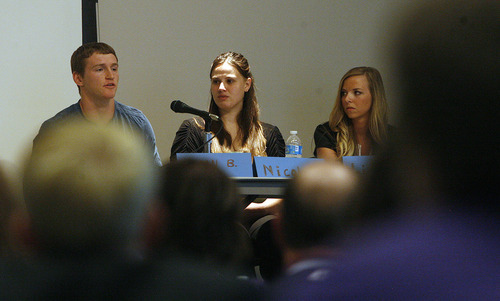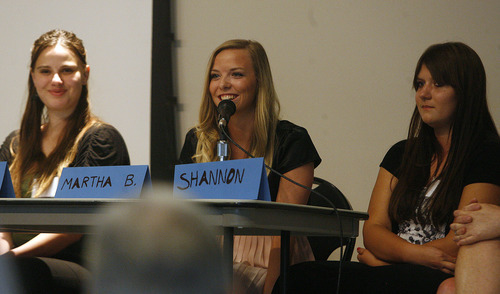This is an archived article that was published on sltrib.com in 2012, and information in the article may be outdated. It is provided only for personal research purposes and may not be reprinted.
Martha Barlow's education ended in the fifth grade, when she was pulled out of school to work in a cabinet shop and a farm. She didn't get back until eight months ago, when she left the Fundamentalist Church of Jesus Christ of Latter-Day Saints.
"Not having your family is definitely a big thing," the 17-year-old said. "That's really hard. Everything else is fine but that, just not having your family there to support you."
Starting again in the 11th grade, she initially struggled to catch up on her academics, working on math through her lunch hour. But she got back up to speed in a year.
Barlow is one of some 750 young people who have left the Warren Jeffs-led FLDS in the past eight years — sometimes known as "Lost Boys."
She spoke Friday at the Safety Net Committee Conference, where officials announced a first: a study surveying young people like Barlow.
"There's just no manual, no academic research," said Pat Merkley, clinical director of the Safety Net, which was started by the Utah attorney general to ensure people from polygamous communities have access to services. The fourth annual conference Friday focused on youth in polygamous communities, from how infants create attachments to their parents to the range of educational experiences in different polygamous groups.
There's a dearth of scholarly research on fundamentalist Mormons, Merkly said, and without it, social workers and therapists have little to guide them.
The results of the survey of 90 young former members of the FLDS held some surprises. For example, the majority of those surveyed said they chose to leave rather than being forced out.
"They don't leave because their families told them to," Merkley said. "That was the most heart-wrenching."
The survey also indicated the majority don't go because they were interacting with the opposite sex or watching TV, both of which are off-limits in the strictly conservative sect.
Rather, a full 80 percent said they left or were forced out because the FLDS limited their ability to make decisions in their own lives.
Once they do leave, 60 percent of the teens said they aren't ever allowed to visit or call home.
Despite being cut off from their families, the vast majority — 87 percent — said they were happy to be living outside of the sect's home base of Colorado City, Ariz., and Hildale, Utah, and were more optimistic about the future.
"They're happy to be gone, but it's a complicated happy," Merkley said, speaking from her experience as a therapist for former FLDS teens.
It took about seven months to conduct the survey, and Merkley hopes it will be a "springboard" for more research in the future.
Partial findings were released Friday; full results will be published in a booklet or in a scholarly journal later.
lwhitehurst@sltrib.comTwitter: @lwhitehurst
The Polygamy Blog: http://www.sltrib.com/blogs/polygblog





